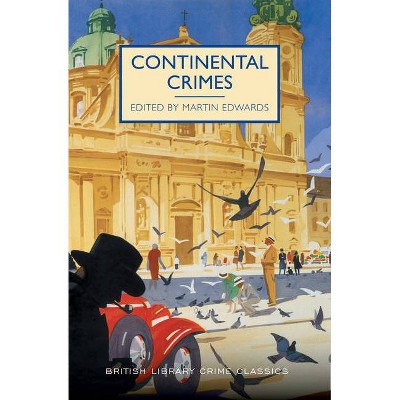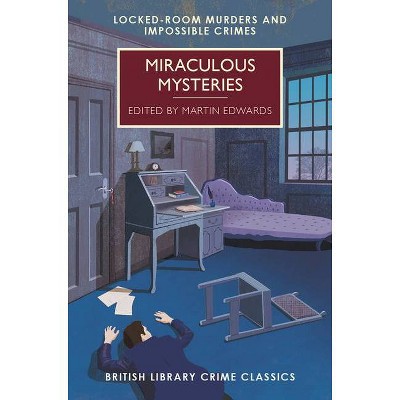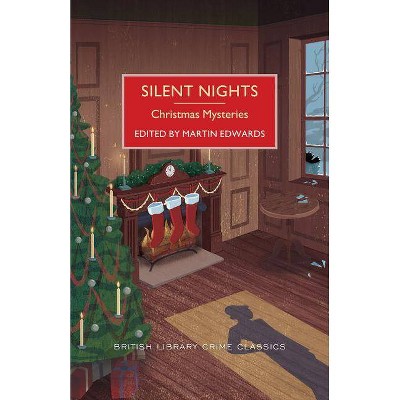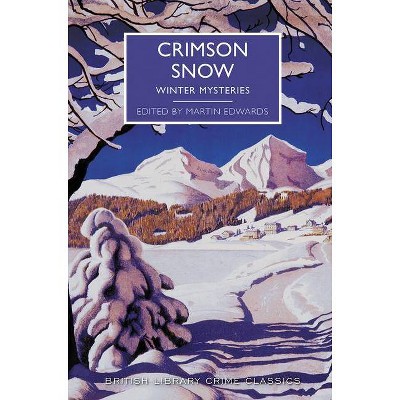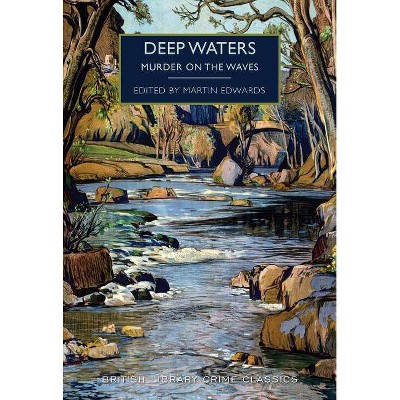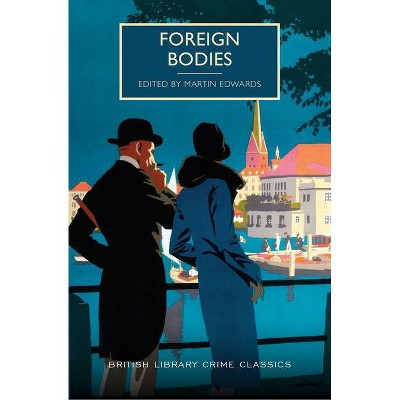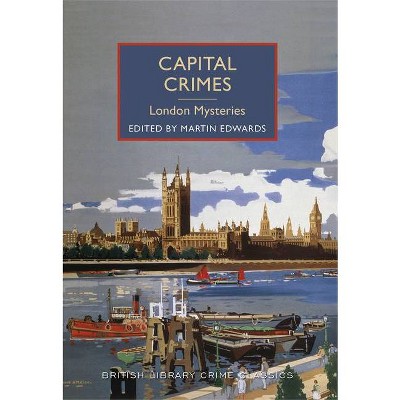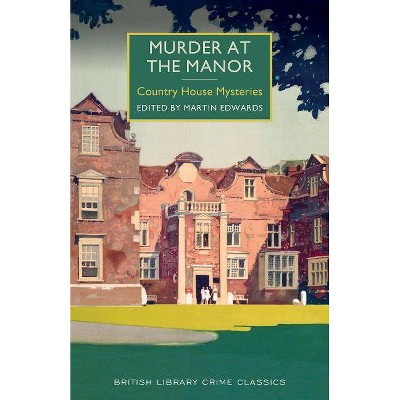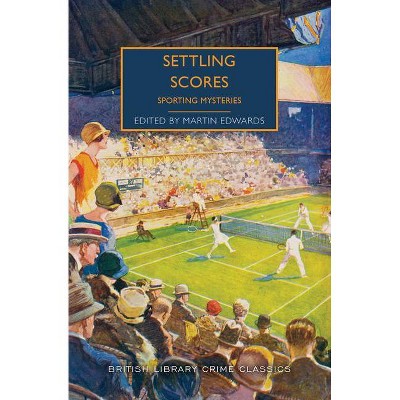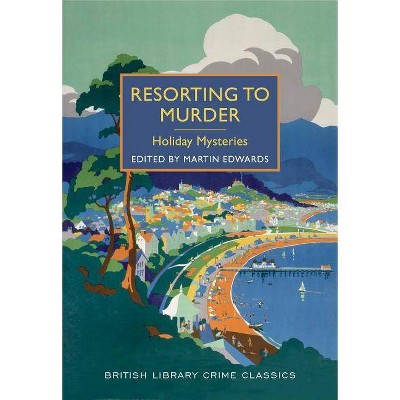Serpents in Eden - (British Library Crime Classics) by Martin Edwards (Paperback)
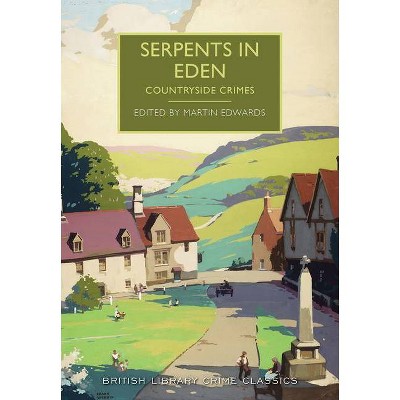
Similar Products
Products of same category from the store
AllProduct info
<p/><br></br><p><b> About the Book </b></p></br></br>A collection of rural British mysteries explores the possibilities of crime in the countryside and features contributions from such authors as Arthur Conan Doyle, G.K. Chesterton, and Anthony Berkeley.<p/><br></br><p><b> Book Synopsis </b></p></br></br>'The lowest and vilest alleys in London do not present a more dreadful record of sin than does the smiling and beautiful countryside.... Think of the deeds of hellish cruelty, the hidden wickedness which may go on, year in, year out, in such places, and none the wiser.' - Sherlock Holmes Many of the greatest British crime writers have explored the possibilities of crime in the countryside in lively and ingenious short stories. Serpents in Eden celebrates the rural British mystery by bringing together an eclectic mix of crime stories written over half a century. From a tale of poison-pen letters tearing apart a village community to a macabre mystery by Arthur Conan Doyle, the stories collected here reveal the dark truths hidden in an assortment of rural paradises. Among the writers included here are such major figures as G. K. Chesterton and Margery Allingham, along with a host of lesser-known discoveries whose best stories are among the unsung riches of the golden age of British crime fiction between the two world wars.<p/><br></br><p><b> Review Quotes </b></p></br></br><br>Another welcome reprint of a British Library book....This time an interesting mix of authors writing about crimes perpetrated in the English countryside....Some of the authors I hadn't known prior to reading this, but will be on the lookout for more of their work.--NetGalley<br><br>It is a great pleasure when a fan is able to discover a new and not-yet-read story from mystery fiction's Golden Age (roughly the first half of the 20th century). The print and e-book publication of Serpents in Eden: Countryside Crimes, an anthology of lesser-known stories by some of the era's most talented writers, is the latest release from The Poisoned Pen Press and the British Library Crime Classics series, allowing readers everywhere to discover these stories anew....Serpents in Eden is edited by Martin Edwards, a prolific writer and mystery literature historian, and he appears to be the perfect candidate for the job. Edwards shows clear love for and knowledge of his field, and every story in the collection highlights those crimes and misdemeanors that can take place in an otherwise idyllic and deceptively safe country setting. This simple thematic link and a natural one, both literally and figuratively, for a genre that has long found menace and shadows in rural isolation, from the Gothic secrets of Jane Eyre to Arthur Conan Doyle's Sherlock Holmes adventure "The Copper Beeches" lets the stories resonate and speak to one another in appealing (and cumulatively sinister) ways....At least three authors take advantage of their settings to deliver brief, vividly comic sketches of their country characters. Margery Allingham's group of Essex farmers discussing the prospect of foul play and sabotage at a gardening competition are full of life and truly of the soil; her 1942 story "A Proper Mystery," which was previously uncollected, incorporates wonderful, concise local color. Leo Bruce uses his short tale to present the unadorned and earthly and very likable Sergeant Beef, who would never be comfortable in a Metropolitan crime squad but who is more than capable of recognizing a "Clue in the Mustard." And my favorite author Gladys Mitchell (see my tribute website at www.gladysmitchell.com) delivers a short study of a rivalry among Morris dancers in "Our Pageant," the concluding story in the collection....Other authors wisely make their idyllic surroundings an essential part of the mystery. H.C. Bailey, an underrated Golden Age author and creator of Reggie Fortune, sets "The Long Barrow" in Dorsetshire, where an archaeologist and his secretary may or may not be up to something more deadly than excavating ancient burial sites. R. Austin Freeman's story "The Naturalist at Law" is especially intriguing as an example of early forensic research as Dr. Thorndyke investigates a drowning in a ditch. And with "The Fad of a Fisherman," G.K. Chesterton presents a tale not featuring Father Brown, but up to that philosopher's clever paradoxical standards of a government official found dead beside a country stream....E.C. Bentley spins a curiously comical story of fraud committed at a vicarage in "The Genuine Tabard." Anthony Berkeley Cox's "Direct Evidence" is intriguing both for the author's winking tone towards the genre one character notes, for example, that it is "quite unthinkable that the brother of a girl who could play tennis like that should have committed a murder" and when contrasted with an alternate version of this story. ("Double Bluff," with a different murderer and outcome, appears in the Cox collection The Avenging Chance and Other Stories published by Crippen & Landru.) And Arthur Conan Doyle has a story here, "The Black Doctor," which was written during his Sherlock Holmes years but does not feature the master detective. The events focus on the trial of a man accused of murdering a dark-skinned physician raised in the Argentine Republic but now practicing medicine in a quiet English village. The absence of Holmes doesn't hurt the story, but a revelation that strains credibility is a bit more damaging. The approach is very explanatory and testamentary, as befits the late Victorian literary style, but the story still engages....Another pleasure with a collection like this is the potential for discovering writers previously unknown to one. There were four here whom I had not read before, and I don't think I will be actively seeking out their work, even though the samples here are competent. Best in show is Ethel Lina White's melodrama "The Scarecrow," concerning an escaped psychopath and an isolated farmhouse: the plot moves along and, like any good thriller writer, she knows which details to provide and which to hold back. Less memorable are "The Gylston Slander" by Herbert Jenkins (a successful publisher in his day job) and "Murder by Proxy" by M. McDonnell Bodkin, a story which suffers from an over-obvious murderer and a questionable alibi method. And Leonora Wodehouse, step-daughter of Plum, contributes "Inquest," a well-written and somber story about the poisoning of a patriarch, the judicial investigation that follows, and a chance encounter on a train with two of the drama's participants years later....If you're a fan of classic detective mysteries, you will thoroughly enjoy Serpents in Eden. Reading these unfamiliar stories written by some of the most creative minds of the era is like sampling the delights of an assorted box of chocolates, some lighter and sweeter, some darker and sharper, but all good. Just don't trust the chocolates if it is Mr. Anthony Berkeley Cox who passes them to you.--NetGalley<br><br>Serpents in Eden is another excellent entry in the British Library Crime Classic series. Collecting short stories from around a fifty year time span, the book demonstrates what a perfect place the country is for crime. Set in the British countryside, the stories are by such familiar luminaries as Sir Arthur Conan Doyle and G.K. Chesterton as well as formerly popular but now almost forgotten authors like H.C. Bailey, Anthony Berkeley, and R. Austin Freeman. What the collection does, collectively, is remind readers how elegantly constructed a mystery can be. There is not a one of these that is not a sleek, honed work of art....It also brings to light new old stories: Without a collection like this, it is unlikely most readers would ever see "The Naturalist at Law" by R. Austin Freeman, and that would be a crying shame. The story makes great use of misdirection, small clues, and its country setting. In fact, I'd challenge anyone to find a more country story than this. "The Genuine Tabard" by E.C. Bentley is not only little known but entirely British; even after the solution is explained to the American tourists, it is hard for an outsider to grasp. Even the better-known detectives are well-served by this collection. G.K. Chesterton is well known, but "The Fad of the Fisherman" is very little collected and it makes solid use of the company of many-motives and an intelligent, sharp-eyed sleuth very different from Father Brown. "A Proper Mystery" by Margery Allingham has never been collected before, and it looks with a mix of humor and affection at the effect a seemingly minor crime can have on a community. The other stories are similarly well-chosen examples of the theme....Serpents in Eden gives readers a chance to revel in good, old-fashioned, puzzle mysteries and the myriad ways they are told. It's a perfect book for mystery aficionados to take with them on a vacation or to curl up with on a weekend.--NetGalley<br><br>Serpents in Eden: Countryside Crimes is another selection in the British Crime Library Classics series. I knew that this was a selection of short stories, and I was pleasantly surprised to find that the crimes within these pages are not all murders....I've said it before, so here it is once again--short story collections are a great way to discover "new" authors, and this collection contains some gems.--NetGalley<br><br>Thirteen short stories all set in the English countryside. Quiet, peaceful, idyllic countryside and the most twisted of crimes....All very good authors of crime stories and all with a twist in the tale! Very interestingly put together and told--NetGalley<br><br>Thirteen short stories, mostly written between the two world wars, reveal the dark side of life in the English countryside. The earliest entries revolve around the fair of face and strong of limb, each with a signature detective who effortlessly unravels a not very knotty puzzle. In M. McDonnell Bodkin's "Murder by Proxy," "young, handsome, debonair" Eric Neville advises his equally attractive cousin John to wire Mr. Beck in London to help discover who shot their uncle, Squire Neville, at his Dorset estate. In G.K. Chesterton's "The Fad of the Fisherman," Horne Fisher solves the murder of Sir Isaac Hook at his West Country manor house. In E.C. Bentley's "The Genuine Tabard," Philip Trent helps George D. Langley, "the finest-looking man in the room," expose a dodgy deal. Perhaps the best of the early puzzles is Arthur Conan Doyle's "The Black Doctor," in which Mr. Humphrey comes to the aid of a landowner accused of murdering his neighbor. The fun doesn't really start, though, until Margery Allingham unmasks the shady side of the Garden Field competition at the village flower show in "A Proper Mystery." Gladys Mitchell adds her take on the perils of Morris dancing in "Our Pageant." The indomitable Sgt. Beef solves the murder of an elderly spinster in Leo Bruce's "Clue in the Mustard." And Ethel Lina White offers a chilling tale of a damsel in distress in "The Scarecrow." But far and away the funniest take on country manners is Leonora Wodehouse's mordant "Inquest," which turns murder into suicide into murder. A volume that may not persuade readers that there's menace in every meadow but certainly shows that English crime isn't confined to the Smoke.--Kirkus<br><br>This anthology caught my eye because not only is about rural mysteries, it had some previously unpublished stories in it. I'm always in the hunt for stories I haven't read yet....Poisoned Pen Press and Net Galley allowed me to read this book for review (thank you). It will be published March 1st....I found a nice mix of authors I knew and ones I didn't in this collection. Some were a bit slow and dry, some were really mind twisting, and some were a good romp in the country. I enjoyed them all but I found the one with Mr. Fortune gratifying. I enjoy that character. There are a couple of others where brain power is the deciding factor in finding the killer. That's another story type I enjoy....You'll find con men, greedy relatives, angry husbands and more in these stories. They all get what they deserve in these stories. Some European mysteries don't end as neatly tied as these did and they bother me. I don't like seeing the bad guys getting away. Of course, I'm sure they paid in the end. What goes around comes around from what I see in life. My grandpa was more direct. He said if you laid down with dogs, you'd get up with fleas....This is a very pleasant group of short stories that are easy to pick up and set down. I read them all in one sitting because I enjoy them. I bet you will, too!--NetGalley<br><br>This book should perhaps be read as a companion to Murder at the Manor; set in the country but with the murders taking place out of doors. In his introduction, Martin Edwards quotes Sherlock Holmes' famous dictum (from The Copper Beeches), that there is more evil undetected in the countryside than in the city. Hence the title: murder in Eden destroys what should be a rural idyll. Again, many of the authors are well known. Conan Doyle appears, with a non-Holmes story and we have G K Chesterton and Margery Allingham, too. I liked the Dr Thorndyke mystery, by R Austin Freeman (must read more of these) and another scary one from Ethel Lina White. I'm usually disappointed when I find a book consists of short stories but these detective ones work well and are just the right length to read while having a cup of tea. What could be cosier? I enjoyed the country house book more than this one, but it's still worth reading. Another book in the British Library Crime Classics series (lovely cover!), which will be out next March.--NetGalley<br><br>This genial anthology contains 13 stories with rural English settings written over half a century or so, many during that golden age of crime fiction between the world wars. The solution of "The Black Doctor," a non-Holmes story by Arthur Conan Doyle, depends on what today's readers would consider a cheap trick, but which was probably quite novel when it appeared in 1898. The lush style of M. McDonnell Bodkin's "Murder by Proxy" nicely conveys an earlier era. Thus a character is "radiant in white flannel, with a broad-brimmed Panama hat perched lightly on his glossy black curls." And when was the last time you heard a cornered murderer exclaim, "Curse you, curse you, you've caught me"? A couple of selections hinge on information that is likely to be of significance only to natives of England, and others require a classical education heavy on Greek and Latin. Still, this volume is bound to please fans of traditional mysteries. (Mar.)--Publishers Weekly<br><br>This is a marvellous collection of short stories from the Golden Age of British crime fiction. This selection of stories contains work by Sir Arthur Conan Doyle, Gladys Mitchell, G K Chesterton, Anthony Berkeley and H C Bailey among others....The theme of this collection is murder in a rural setting. My particular favourite in this collection are E C Bentley's 'The Genuine Tabard' - which doesn't include a murder but is definitely worth reading for the sheer delight of the story. I also enjoyed 'The Gylston Slander' by Herbert Jenkins - poison pen letters; and 'The Naturalist at Law' by R Austin Freeman....All the stories in this collection are well worth reading and some will remain with you long after you have finished reading the book. In my opinion this is on of the best short story collections in this excellent series.--Jillysheep<br><br>Throughout December, I enjoyed reading a book called Silent Nights. The carefully chosen collection from the Golden Age of British crime fiction was perfect for such a busy month, as the stories were short and complete with plenty of detail and nicely wrapped up endings....This is the second book of short stories I have read from the same time period. This selection of stories have a rural theme and contains works by Sir Arthur Conan Doyle, Gladys Mitchell, G K Chesterton, Anthony Berkeley and H C Bailey among others....If you like mysteries, I am sure you will find this book as enjoyable as I have.--Goodreads<br><br>Edwards provides both enthusiastic introductions and careful selection of stories, some old favorites and some neglected but well worth reading.--Peter E. Blau<br><p/><br></br><p><b> About the Author </b></p></br></br><p><strong>MARTIN EDWARDS</strong> is an award-winning crime writer best known for two series of novels set in Liverpool and the Lake District. He is a series consultant for British Library Crime Classics, Chair of the Crime Writers' Association, and President of the Detection Club. <em>The Golden Age of Murder</em>, his study of the Detection Club, was published in 2015 to international acclaim, and won the Edgar, Agatha, H.R.F. Keating and Macavity awards for the year's best book about the genre.</p>
Price History
Cheapest price in the interval: 11.89 on October 22, 2021
Most expensive price in the interval: 14.79 on May 23, 2021
Price Archive shows prices from various stores, lets you see history and find the cheapest. There is no actual sale on the website. For all support, inquiry and suggestion messagescommunication@pricearchive.us
